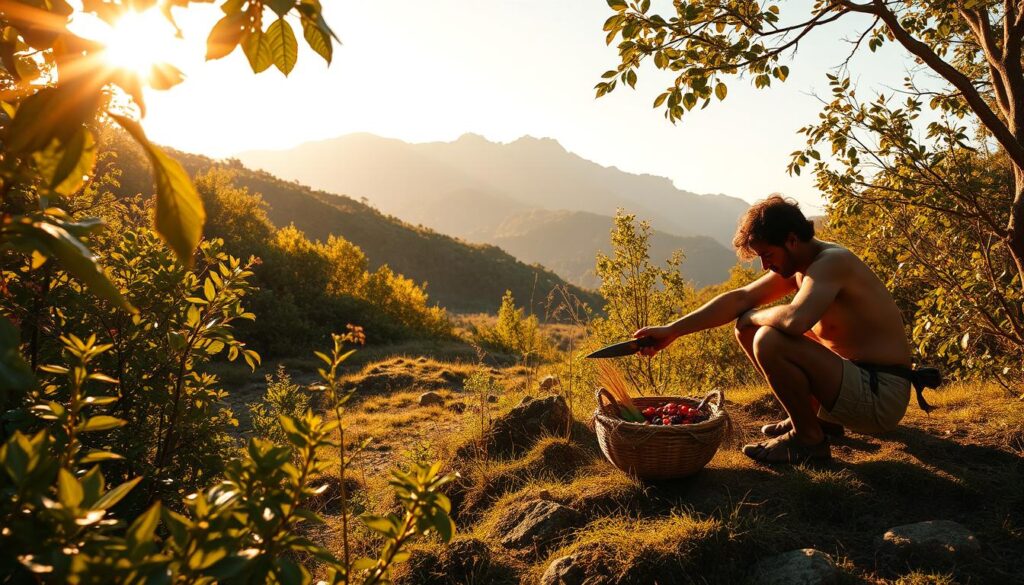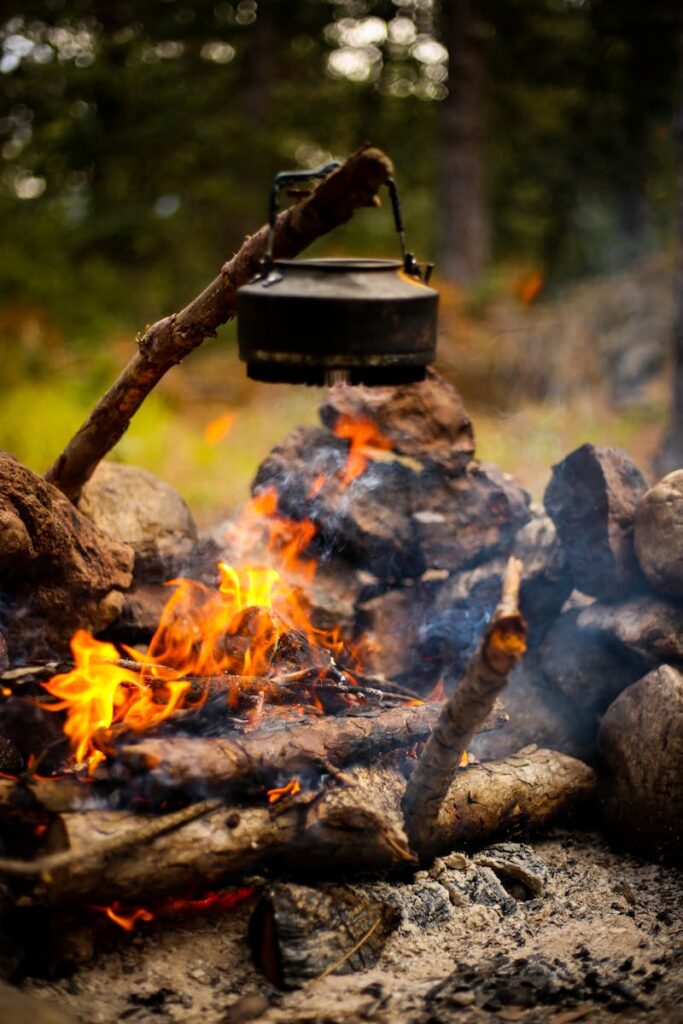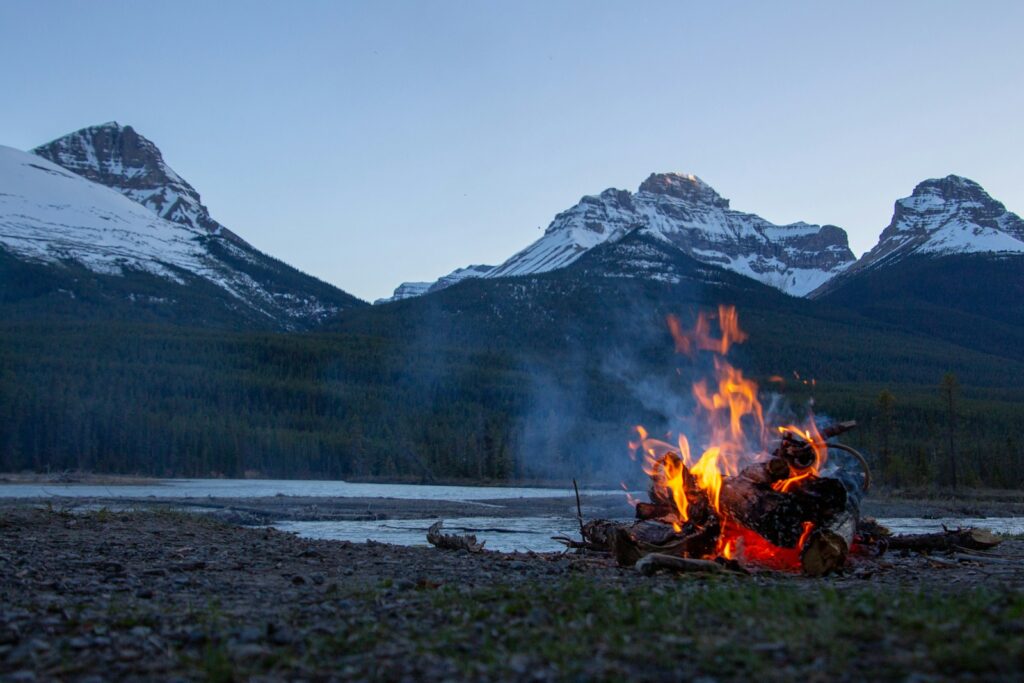Imagine standing in a sunlit forest, hands covered in dirt, plucking ripe blackberries from a thorny thicket. Nearby, a freshly caught trout rests in a woven basket. This isn’t some scene from a history book – it’s the modern-day pursuit of self-sufficiency. As Danielle Prewett puts it in Living Wild, there’s a raw power in bypassing grocery aisles and sourcing your meals through skill and patience.
We’ve rediscovered what our ancestors knew: engaging directly with nature changes how we live. Every foraged mushroom or line-caught fish becomes more than just dinner – it’s a conversation with the land. This practice requires effort, but it rewards us with clarity and satisfaction that modern life often lacks.
Join us as we explore how reconnecting with ancient ways of living creates unexpected fulfillment. Let’s dive into the joys and benefits of hunting and gathering your own food – from foraging wild plants to processing game.
Reconnecting with Nature
When you track deer through oak groves or identify edible plants, you’re learning something apps could never teach you. It’s not just about hunting or gathering – it’s about observing nature, reading the signs it gives us, and gaining a deeper connection to the world around us. Nature’s “notifications” come in the form of broken twigs, overturned stones, and the subtle rhythms of animal movements. The more we learn, the clearer our perspective becomes – and surprisingly, the more grounded we feel.

The Rewards of Effort
The first time you skin a rabbit or collect wild onions, it becomes clear: nourishment isn’t automatic. It takes work – and that effort connects us to something greater. Commercial food systems can’t replicate the satisfaction of knowing that you’ve directly sourced and prepared your meal. Each act, from catching fish to drying herbs, becomes a bridge between the past and present.
It’s not just about the food itself – it’s about reclaiming a piece of our heritage. As one forager shared, “Peeling acorns connects my hands to every ancestor who refused to starve.”
A Journey into Culinary Mastery
The sizzle of wild boar fat hitting a hot cast-iron skillet marks the beginning of a culinary transformation. What started as field dressing game or foraging mushrooms becomes gourmet-level cooking. Tracking animals isn’t just about stealth – it’s about understanding how each ingredient wants to be prepared and cooked. The result? Wild foods that taste better than anything from a supermarket.
Take smoked trout, for example – a simple catch turned into rillettes, or acorn flour transformed into delicate pasta. The possibilities are endless. What begins with dirt-stained hands ends with meals that redefine “farm-to-table.”

Skills that Rewire Your Mind
Handling your own food not only builds skills but also rewires the way you think. One hunter-turned-chef put it this way: “Plating wild mushrooms feels like honoring every hour spent learning their habitats.” These small acts of creation build confidence and shift our mindset – from consumers to creators.
As you master these skills, you start to realize that free time spent in nature or cooking isn’t wasted; it’s empowering. You’re not just ticking boxes on a to-do list – you’re building a legacy of knowledge and connection.
Embracing a Balanced Life
Hunter-gatherer societies, contrary to what we often think, weren’t constantly working. Studies of the Ju/’hoansi people, for instance, show they only worked about 15 hours a week to secure their food. That’s less than half a modern workweek! What they did with their free time was equally important – storytelling, skill-sharing, and strengthening bonds within the community.
This balanced approach to work and leisure is something we’ve lost in today’s hectic world. But by adopting just a few of these ancient practices, like taking breaks to connect with nature, we can recalibrate our relationship with time.
Finding Fulfillment in Self-Sufficiency
Modern life has made us more reliant on conveniences, but we’ve discovered that blending ancient wisdom with contemporary tools builds real self-reliance. Mastering foraging techniques, setting up a small garden, or learning preservation methods can have a profound effect on our well-being.
Urban foragers are already turning their backyards into edible landscapes, using mobile apps to identify wild plants, swapping skills with neighbors, and experimenting with preservation techniques. The results? Less stress, more satisfaction, and a stronger connection to the environment.
The Surprising Truth About Work and Leisure
One of the most surprising lessons we’ve learned through hunting and gathering is that we don’t need to work harder to achieve more. In fact, the most successful hunter-gatherer societies worked fewer hours but achieved greater abundance by working smarter, not harder. By aligning effort with natural cycles and giving ourselves permission to rest, we can reclaim our time and achieve greater satisfaction in both work and leisure.
Hunter-gatherers understood the importance of rest. Their work was intense and focused, but they also knew when to take a step back and let their minds and bodies recover. Modern life doesn’t have to be a constant grind. We can take a cue from the past by embracing more strategic rest – whether that means taking a walk in the woods or swapping office meetings for outdoor breaks.
Nature as a Classroom
Foraging and hunting teach us to pay attention – really pay attention – to the world around us. Every walk in the woods becomes a treasure hunt, where knowledge about edible plants, wildlife, and preservation techniques is gained with each step.
This doesn’t just build practical skills; it builds mindfulness. By immersing ourselves in nature, we sharpen our awareness and reconnect with what’s truly important. It’s a shift from constantly consuming information to actively engaging with the environment in a meaningful way.

Small Changes, Big Impact
You don’t have to become a full-time hunter or forager to start benefiting from these practices. Begin small. Try swapping a weekend trip to the grocery store for a walk through a local park to identify edible plants. Experiment with preserving herbs or fruits. Over time, you’ll notice your relationship with food – and your time – shifting in powerful ways.
Studies show that people who engage in self-sufficiency practices report lower stress levels. The key is taking small steps, gradually adding more skills to your repertoire, and embracing the satisfaction of doing something for yourself.
Conclusion: Rediscovering True Abundance
Our journey back to hunting and gathering has taught us a lot about fulfillment. It’s not about hoarding more; it’s about needing less. It’s about slowing down, embracing the rhythms of nature, and reconnecting with the land that provides for us. Every meal we prepare, every plant we forage, and every animal we catch reminds us of a deeper connection to our ancestors and the world around us.
By integrating some of these ancient practices into our daily lives, we can rediscover the true meaning of abundance. So, the next time you prepare a meal from something you’ve sourced yourself, take a moment to appreciate the effort, the connection, and the satisfaction that comes from it. This is real wealth, and it’s right at your fingertips.









